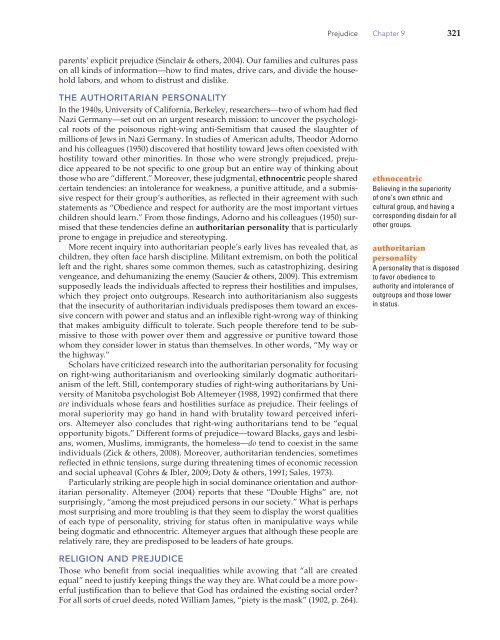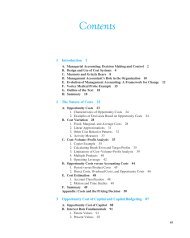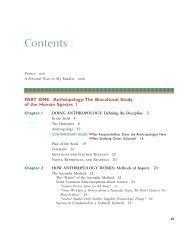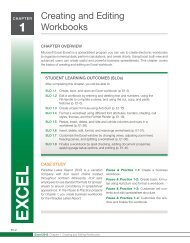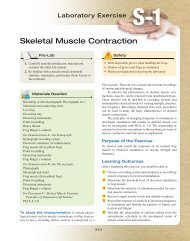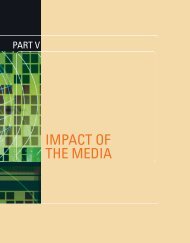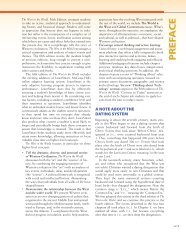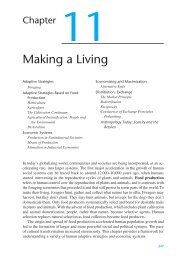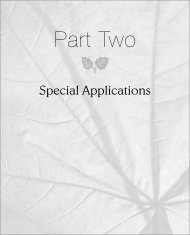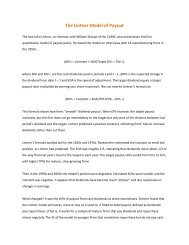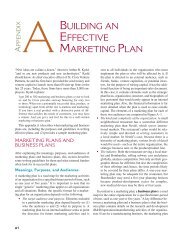Chapter 9: Prejudice: Disliking Others (2947.0K) - Bad Request
Chapter 9: Prejudice: Disliking Others (2947.0K) - Bad Request
Chapter 9: Prejudice: Disliking Others (2947.0K) - Bad Request
You also want an ePaper? Increase the reach of your titles
YUMPU automatically turns print PDFs into web optimized ePapers that Google loves.
parents’ explicit prejudice (Sinclair & others, 2004). Our families and cultures pass<br />
on all kinds of information—how to find mates, drive cars, and divide the household<br />
labors, and whom to distrust and dislike.<br />
THE AUTHORITARIAN PERSONALITY<br />
In the 1940s, University of California, Berkeley, researchers—two of whom had fled<br />
Nazi Germany—set out on an urgent research mission: to uncover the psychological<br />
roots of the poisonous right-wing anti-Semitism that caused the slaughter of<br />
millions of Jews in Nazi Germany. In studies of American adults, Theodor Adorno<br />
and his colleagues (1950) discovered that hostility toward Jews often coexisted with<br />
hostility toward other minorities. In those who were strongly prejudiced, prejudice<br />
appeared to be not specific to one group but an entire way of thinking about<br />
those who are “different.” Moreover, these judgmental, ethnocentric people shared<br />
certain tendencies: an intolerance for weakness, a punitive attitude, and a submissive<br />
respect for their group’s authorities, as reflected in their agreement with such<br />
statements as “Obedience and respect for authority are the most important virtues<br />
children should learn.” From those findings, Adorno and his colleagues (1950) surmised<br />
that these tendencies define an authoritarian personality that is particularly<br />
prone to engage in prejudice and stereotyping.<br />
More recent inquiry into authoritarian people’s early lives has revealed that, as<br />
children, they often face harsh discipline. Militant extremism, on both the political<br />
left and the right, shares some common themes, such as catastrophizing, desiring<br />
vengeance, and dehumanizing the enemy (Saucier & others, 2009). This extremism<br />
supposedly leads the individuals affected to repress their hostilities and impulses,<br />
which they project onto outgroups. Research into authoritarianism also suggests<br />
that the insecurity of authoritarian individuals predisposes them toward an excessive<br />
concern with power and status and an inflexible right-wrong way of thinking<br />
that makes ambiguity difficult to tolerate. Such people therefore tend to be submissive<br />
to those with power over them and aggressive or punitive toward those<br />
whom they consider lower in status than themselves. In other words, “My way or<br />
the highway.”<br />
Scholars have criticized research into the authoritarian personality for focusing<br />
on right-wing authoritarianism and overlooking similarly dogmatic authoritarianism<br />
of the left. Still, contemporary studies of right-wing authoritarians by University<br />
of Manitoba psychologist Bob Altemeyer (1988, 1992) confirmed that there<br />
are individuals whose fears and hostilities surface as prejudice. Their feelings of<br />
moral superiority may go hand in hand with brutality toward perceived inferiors.<br />
Altemeyer also concludes that right-wing authoritarians tend to be “equal<br />
opportunity bigots.” Different forms of prejudice—toward Blacks, gays and lesbians,<br />
women, Muslims, immigrants, the homeless— do tend to coexist in the same<br />
individuals (Zick & others, 2008). Moreover, authoritarian tendencies, sometimes<br />
reflected in ethnic tensions, surge during threatening times of economic recession<br />
and social upheaval (Cohrs & Ibler, 2009; Doty & others, 1991; Sales, 1973).<br />
Particularly striking are people high in social dominance orientation and authoritarian<br />
personality. Altemeyer (2004) reports that these “Double Highs” are, not<br />
surprisingly, “among the most prejudiced persons in our society.” What is perhaps<br />
most surprising and more troubling is that they seem to display the worst qualities<br />
of each type of personality, striving for status often in manipulative ways while<br />
being dogmatic and ethnocentric. Altemeyer argues that although these people are<br />
relatively rare, they are predisposed to be leaders of hate groups.<br />
RELIGION AND PREJUDICE<br />
Those who benefit from social inequalities while avowing that “all are created<br />
equal” need to justify keeping things the way they are. What could be a more powerful<br />
justification than to believe that God has ordained the existing social order?<br />
For all sorts of cruel deeds, noted William James, “piety is the mask” (1902, p. 264).<br />
<strong>Prejudice</strong> <strong>Chapter</strong> 9 321<br />
ethnocentric<br />
Believing in the superiority<br />
of one’s own ethnic and<br />
cultural group, and having a<br />
corresponding disdain for all<br />
other groups.<br />
authoritarian<br />
personality<br />
A personality that is disposed<br />
to favor obedience to<br />
authority and intolerance of<br />
outgroups and those lower<br />
in status.


